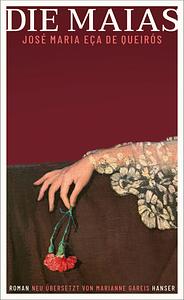Take a photo of a barcode or cover
even though it was a mandatory read for an essay and some rats were difficult to read some parts and characters were really funny
Opinião completa e quote aqui: http://presa-nas-palavras.blogspot.com/2016/07/os-maias-opiniao.html
Depois de não o ter conseguido ler na altura que andava no liceu, decidi dar uma chance a este livro e, honestamente, não me custou tanto como na altura da escola.
Para quem não sabe, os Maias é um livro que retrata a aristocracia portuguesa da época tendo como protagonista Carlos da Maia.
O livro vai acompanhar o romance entre Carlos e Maria Eduarda (que vai ter um grande atropelo que praticamente toda a gente conhece mas que eu prefiro não referir para aqueles que desconhecem), vão haver críticas à aristocracia portuguesa (nomeadamente no episódio das corridas de cavalo) e críticas à educação portuguesa.
O livro em si tem uma história bastante boa. O meu maior problema deu-se porque eu achei que foram demasiadas páginas (perto de 600 em todas as edições) para contar uma história tão simples. Percebo que foram necessárias, mas acho maçador tantas páginas de descrições longas e pormenorizadas, cheias de elementos trágicos.
Entretanto houveram algumas personagens que me irritaram, como o Eusebiozinho e o Damâso (mas penso que ambos foram criados para ter esse fim nas pessoas).
Entretanto algo que eu gostei imenso foi dos indícios trágicos. Acho que eles estavam muito bem feitos e realmente acrescentava algo para a história e preparava-nos para o final que, ao contrário da maioria das pessoas, eu gostei imenso.
Aconselho a quem tentar ler a não desistir nas primeiras 50 páginas que são realmente maçadoras e cheias de descrições, mas depois melhora.
Boas leituras.
Depois de não o ter conseguido ler na altura que andava no liceu, decidi dar uma chance a este livro e, honestamente, não me custou tanto como na altura da escola.
Para quem não sabe, os Maias é um livro que retrata a aristocracia portuguesa da época tendo como protagonista Carlos da Maia.
O livro vai acompanhar o romance entre Carlos e Maria Eduarda (que vai ter um grande atropelo que praticamente toda a gente conhece mas que eu prefiro não referir para aqueles que desconhecem), vão haver críticas à aristocracia portuguesa (nomeadamente no episódio das corridas de cavalo) e críticas à educação portuguesa.
O livro em si tem uma história bastante boa. O meu maior problema deu-se porque eu achei que foram demasiadas páginas (perto de 600 em todas as edições) para contar uma história tão simples. Percebo que foram necessárias, mas acho maçador tantas páginas de descrições longas e pormenorizadas, cheias de elementos trágicos.
Entretanto houveram algumas personagens que me irritaram, como o Eusebiozinho e o Damâso (mas penso que ambos foram criados para ter esse fim nas pessoas).
Entretanto algo que eu gostei imenso foi dos indícios trágicos. Acho que eles estavam muito bem feitos e realmente acrescentava algo para a história e preparava-nos para o final que, ao contrário da maioria das pessoas, eu gostei imenso.
Aconselho a quem tentar ler a não desistir nas primeiras 50 páginas que são realmente maçadoras e cheias de descrições, mas depois melhora.
Boas leituras.
The Maias, by Eça de Queiroz/de Queirós, is a proper doorstop of a C19th novel, over 700 pages long. It’s late C19th, though, 1888. I was trying to think of apt comparisons, and none of them seemed exactly right, but it’s much more George Eliot or Tolstoy than Dickens. Or even early C20th novelists like Forster or Proust. Though the Proust comparison is not so much to do with style as subject matter: the romantic entanglements of wealthy, mildly bohemian society types.
Among the themes running through the book, the one I found most interesting was the question of Portugal’s place in the world, which is seen in terms of tradition vs. modernity but also Portugal’s cultural relationship with other European powers: there’s a real sense of a smallish country on the edge of Europe looking towards London and Paris with a hint of an inferiority complex. So the characters swing between claiming unique virtues for Portugal and admiring, for example, a dress that could only have come from Paris. Every discussion, of literature or an event or whatever, turns to comparisons with other countries; the yardstick for quality is an external one. It’s oddly like reading post-colonial fiction, even though Portugal was in fact colonist rather than colonised.
I think what I liked most about the book was the leisurely pace of it. Events at which nothing much happens — or at least nothing which is essential to advancing the plot —are allowed to spread over five or ten pages. There’s a 30-page description of them going to the races which is a big set piece within the book, full of social observation, incident and humour, but none of it is actually crucial to the plot. On another occasion, in another mood, I might have just been bored by it; but this time I enjoyed that expansiveness.
In Lisbon, from the Grémio to the Casa Havanesa, there was already talk of ‘Ega’s mistress’. He, for his part, was trying very hard to keep his happiness safe from prying eyes. While perfectly serious about the complicated precautions this entailed, he also took a romantic delight in mystery, and so always chose the most out-of-the-way places, on the outskirts of the city, in the area near the slaughterhouse, for his furtive meetings with the maid who brought him Raquel’s letters. But his every gesture (event he affected way he had of pretending not to look at the clock) revealed the enormous pride he felt in that elegant adultery. He was perfectly aware that his friends knew all about this glorious adventure of his, and were au fait with the whole drama, and this was perhaps why, when in the company of Carlos or the others, he never even mentioned her name or betrayed the slightest flicker of emotion.
One night, however, a night lit by a calm white moon, as he and Carlos were walking along together in silence on their way to Ramalhete, Ega, doubtless filled by a sudden inrush of passion, uttered a heartfelt sigh, reached out his arms and declared to the moon in a tremulous voice:
Oh, laisse-toi donc aimer, oh, l’amour c’est la vie!
This escaped his lips like the beginning of a confession. Carlos, at his side, said nothing, and simply blew his cigar smoke out into the air.
Ega clearly felt somewhat ridiculous, because he immediately recovered himself and pretended a mere literary interest.
‘They can say what they want, but there’s no one like old Hugo.’
Carlos still said nothing, but he recalled Ega’s Naturalist outbursts, in which he had inveighed against Victor Hugo, calling him a ’spiritualist blabbermouth’, ‘an imitative yokel’, ‘a lyrical old fool’ and worse.
But that night, Ega, the great phrase-maker, went on:
‘Ah yes, old Hugo, the heroic champion of the eternal truths. We need a bit of idealism, damn it, because the ideal might one day become reality.’
And with this formal recantation he shattered the silence of the streets.
A quick name-check for Margaret Jull Costa, who translated this edition, and has done a good job of it, as far as I can tell without knowing any Portuguese.
Among the themes running through the book, the one I found most interesting was the question of Portugal’s place in the world, which is seen in terms of tradition vs. modernity but also Portugal’s cultural relationship with other European powers: there’s a real sense of a smallish country on the edge of Europe looking towards London and Paris with a hint of an inferiority complex. So the characters swing between claiming unique virtues for Portugal and admiring, for example, a dress that could only have come from Paris. Every discussion, of literature or an event or whatever, turns to comparisons with other countries; the yardstick for quality is an external one. It’s oddly like reading post-colonial fiction, even though Portugal was in fact colonist rather than colonised.
I think what I liked most about the book was the leisurely pace of it. Events at which nothing much happens — or at least nothing which is essential to advancing the plot —are allowed to spread over five or ten pages. There’s a 30-page description of them going to the races which is a big set piece within the book, full of social observation, incident and humour, but none of it is actually crucial to the plot. On another occasion, in another mood, I might have just been bored by it; but this time I enjoyed that expansiveness.
In Lisbon, from the Grémio to the Casa Havanesa, there was already talk of ‘Ega’s mistress’. He, for his part, was trying very hard to keep his happiness safe from prying eyes. While perfectly serious about the complicated precautions this entailed, he also took a romantic delight in mystery, and so always chose the most out-of-the-way places, on the outskirts of the city, in the area near the slaughterhouse, for his furtive meetings with the maid who brought him Raquel’s letters. But his every gesture (event he affected way he had of pretending not to look at the clock) revealed the enormous pride he felt in that elegant adultery. He was perfectly aware that his friends knew all about this glorious adventure of his, and were au fait with the whole drama, and this was perhaps why, when in the company of Carlos or the others, he never even mentioned her name or betrayed the slightest flicker of emotion.
One night, however, a night lit by a calm white moon, as he and Carlos were walking along together in silence on their way to Ramalhete, Ega, doubtless filled by a sudden inrush of passion, uttered a heartfelt sigh, reached out his arms and declared to the moon in a tremulous voice:
Oh, laisse-toi donc aimer, oh, l’amour c’est la vie!
This escaped his lips like the beginning of a confession. Carlos, at his side, said nothing, and simply blew his cigar smoke out into the air.
Ega clearly felt somewhat ridiculous, because he immediately recovered himself and pretended a mere literary interest.
‘They can say what they want, but there’s no one like old Hugo.’
Carlos still said nothing, but he recalled Ega’s Naturalist outbursts, in which he had inveighed against Victor Hugo, calling him a ’spiritualist blabbermouth’, ‘an imitative yokel’, ‘a lyrical old fool’ and worse.
But that night, Ega, the great phrase-maker, went on:
‘Ah yes, old Hugo, the heroic champion of the eternal truths. We need a bit of idealism, damn it, because the ideal might one day become reality.’
And with this formal recantation he shattered the silence of the streets.
A quick name-check for Margaret Jull Costa, who translated this edition, and has done a good job of it, as far as I can tell without knowing any Portuguese.
challenging
emotional
informative
inspiring
sad
slow-paced
Strong character development:
Yes
Loveable characters:
Complicated
Diverse cast of characters:
Yes
Flaws of characters a main focus:
Complicated
A wonderful, wonderful Portuguese classic.
This book definitely isn't the right one for me. It has pacing issues and the characters, even though they are well rounded, aren't likable.



